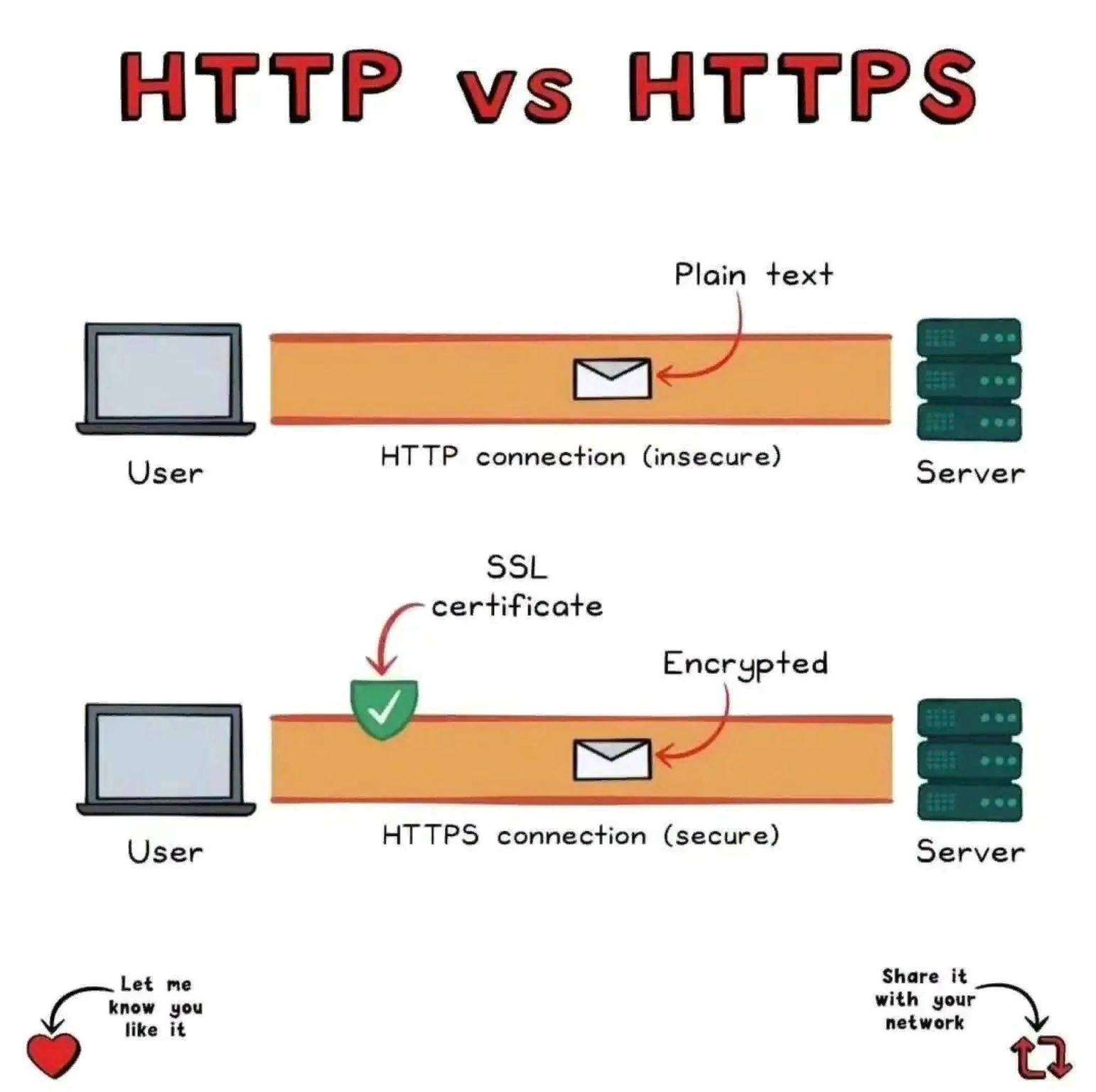When you look at your browser’s address bar, you probably recognize the commonly used acronym “HTTPS.” But, do you know what this acronym means?
Casual users even rarely notice that there are two options for the start of a URL, i.e., HTTPS (https://) and HTTP (or, http://).
If you’re interested in learning about internet security, consider this to be your first lesson.
What Is HTTP?
HTTP, or Hypertext Transfer Protocol, is most commonly used for transferring data from a web server to a browser, so users are able to view web pages.
It was created in the early 1990s by Tim Berners-Lee when the internet was still in its early stages.
What Is HTTPS?
HTTPS, or Hypertext Transfer Protocol Secure, encrypts communications by using an encryption protocol. The protocol was formerly known as the Secure Sockets Layer (SSL), and now it is known as the Transport Layer Security (TLS).
HTTPS adds integrity, authentication, and encryption to the HTTP protocol.
What Is the Difference Between HTTPS and HTTP?
Difference Between HTTPS and HTTP
Between the two protocols, the most important difference is the SSL certificate. Basically, HTTPS is an HTTP protocol with added security.
Without HTTPS, any data that you enter into a site (your credit card or bank details, username and password, or any other data you submit) will be sent plaintext, making it vulnerable to eavesdropping or interception.
Besides encrypting the data between your browser and server, HTTPS also verifies the server you connect to and prevents tampering with the transmitted data.
The benefits we mentioned above – protection of the exchanges from tampering, encryption of data transmission, and authentication of the server, are the most obvious difference between HTTPS and HTTP.
Why Should HTTPS Be Enabled on Your Website?
Why Should HTTPS Be Enabled
1. Good for Search
HTTPS helps with search engine optimization (SEO). If you have ever wondered why your products, services, or website isn’t the number one on search engines like Google, the reason for that is SEO.
Search engines use different ranking factors to organize their search results, and SEO is the practice of optimizing websites according to these factors. One ranking factor that Google, the largest search engine, uses is HTTPS.
2. Better for Users
Besides offering benefits for your company, HTTPS is also better for your customers. Whether your brand focuses on sales online or generating leads, you want the data of your current and potential clients to be safe.
Most customers wouldn’t want to do business with a brand where their data, financial or personal, got stolen.
Visitors will not only get protection on their sensitive data like credit card information and passwords, but they will also get protection on their browsing history.
3. SSL Is Required for AMP
If you want to create an AMP (Accelerated Mobile Pages), then HTTPS is a requirement. Google created AMP as a way for content to be loaded onto mobile devices at a much faster rate.
There is an increasing importance of mobile search rankings, so creating a mobile-friendly website should be one of your priorities. With this in mind, HTTPS is an absolute must-have.
4. Google Is Indexing Mobile
Google Mobile Indexing
Like we previously mentioned, there is a growing significance of mobile search rankings, which is why you need HTTPS.
In the past, Google used the desktop version of a certain website for indexing and ranking. Nowadays, Google predominantly uses the mobile version of the site when evaluating the relevance of a page.
Google primarily does mobile indexing since the majority of Google’s users search with a mobile device.
5. Not Secure
The core benefit of HTTPS is that it secures your website. HTTPS provides encrypted communication. Essentially, what this means is that all of the data that your site collects is transferred with armor.
HTTP is fine if you’re browsing a website and looking at a knit sweater or cat memes. However, if you’re entering credit card information or logging into your bank account, having HTTPS is essential. Otherwise, your data is at a huge risk.
6. Limited Browser Warnings
Your visitors will get a warning telling them that the site isn’t secure if you don’t have HTTPS. This message will be displayed in the address bar, right next to the URL. These messages can be annoying and unpleasant to look at.
How HTTPS Helps SEO?
How HTTPS Helps SEO
In 2014, Google made a statement that in case there is a tie between two equal search results, HTTPS can break the tie.
Google confirmed that a secure website with an SSL certificate would have the upper hand over websites that are not encrypted and secure if the other search engine optimization factors stay the same.
Google encouraged website owners to migrate to a secure site. Having an SSL certificate can give website owners a boost in making their websites more competitive in their industry.
HTTPS also improves SEO by improving user experience. A person will quit browsing a certain website if they see indicators that the site isn’t secure. Websites can rank in top positions if they offer a poor user experience.
If you have a shop or request any type of personal information, the lack of HTTPS will likely mean that visitors won’t trust your site and click away.
Not having an HTTPS can have a big impact on your visitor’s time on the site and your bounce rates.
At Verpex, we offer different types of hosting plans that will suit your needs. Besides many other development resources, we also offer free SSL certificates with our plans.
How to Set Up HTTPS?
How to Set Up HTTPS
If you’re launching a new website, just set up HTTPS from the beginning. All you need to do is find a good hosting provider that supports the latest TLS and HTTP protocol versions and will support you through the process. At Verpex, we will take care of it for you, and you just focus on your business.
HSTS, or HTTP Strict Transport Policy, is a mechanism that helps protect websites against man-in-the-middle attacks like cookie hijacking and protocol downgrade attacks.
The last step to seal the security after you’ve set up everything is to implement HSTS.
In case you already have an HTTPS-enabled website, and you can’t set up HTTPS, you’ve probably done something incorrectly.
Make sure you check for potential HTTPS mistakes, like ensuring that all pages on your website are already on HTTPS and updating your internal links to HTTPS. Also, make sure that your open graph tags and canonical tags are updated to HTTPS.
Lastly, if you have a site that’s running on HTTP, it can take a bit of time to set up HTTPS. The complexity of the migration to HTTPS depends on your technical abilities, your hosting providers, what kind of CMS you use, and the complexity and size of your website.
A small business that runs on a popular CMS and has strong hosting providers can migrate more easily. Verpex would happily assist your small business with the migration of its site.
20%
💰 EXTRA 20% OFF ALL VERPEX SHARED WEB HOSTING PLANS
with the discount code
AWESOME
Summary
To sum it up, if you want to thrive and survive in the digital landscape of today, you will definitely need an encrypted website.
You want your website to be secure so visitors can feel comfortable browsing it, and you want to protect their potentially sensitive information.
The internet has billions of users, and the combination of encouragement from browsers and user demand makes it clear that soon there will be a full transition from HTTP to HTTPS.
However, once you’ve implemented HTTPS, the process doesn’t end there. To get the most benefits, keep up with the trends in security and web performance, and make sure you implement the latest features available.

